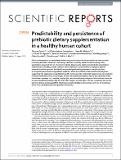Predictability and persistence of prebiotic dietary supplementation in a healthy human cohort
Author(s)
Ananthakrishnan, Ashwin; Kassam, Zain; Gurry, Thomas Jerome; Gibbons, Sean Michael; Nguyen, Le Thanh Tu; Jiang, Xiaofang; Duvallet, Claire; Alm, Eric J; Kearney, Sean Michael; ... Show more Show less
Downloads41598-018-30783-1.pdf (2.254Mb)
PUBLISHER_CC
Publisher with Creative Commons License
Creative Commons Attribution
Terms of use
Metadata
Show full item recordAbstract
Dietary interventions to manipulate the human gut microbiome for improved health have received increasing attention. However, their design has been limited by a lack of understanding of the quantitative impact of diet on a host’s microbiota. We present a highly controlled diet perturbation experiment in a healthy, human cohort in which individual micronutrients are spiked in against a standardized background. We identify strong and predictable responses of specific microbes across participants consuming prebiotic spike-ins, at the level of both strains and functional genes, suggesting fine-scale resource partitioning in the human gut. No predictable responses to non-prebiotic micronutrients were found. Surprisingly, we did not observe decreases in day-to-day variability of the microbiota compared to a complex, varying diet, and instead found evidence of diet-induced stress and an associated loss of biodiversity. Our data offer insights into the effect of a low complexity diet on the gut microbiome, and suggest that effective personalized dietary interventions will rely on functional, strain-level characterization of a patient’s microbiota.
Date issued
2018-08Department
Massachusetts Institute of Technology. Center for Microbiome Informatics and Therapeutics; Massachusetts Institute of Technology. Department of Biological EngineeringJournal
Scientific Reports
Publisher
Nature Publishing Group
Citation
Gurry, Thomas et al. “Predictability and Persistence of Prebiotic Dietary Supplementation in a Healthy Human Cohort.” Scientific Reports 8, 1 (August 2018): 12699 © 2018 The Author(s)
Version: Final published version
ISSN
2045-2322